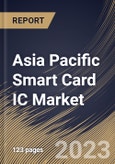The acceptance of USIM/eSIM in various consumer electronic devices, including smartphones, tablets, smartwatches, and IoT devices, is also responsible for the growing demand for smart card IC. In order to integrate eSIM technology with their most recent smartphone series, numerous smartphone manufacturing organizations are working on it. Additionally, the demand for smart phones is also increasing owing to the increased personal disposable incomes of people.
The widespread use of smart cards for tasks including identity management, payment, and access control is fueling the market's expansion. The market is also fueled by smart cards' expanding usage of biometrics. Smart cards increasingly use biometrics, an emerging technology, to authenticate and verify identity. Because of the growing demand for higher levels of security, the usage of biometrics in smart cards is anticipated to increase dramatically in the upcoming years.
Smart cards used properly have been demonstrated to be effective in preventing theft and fraud across all industries. The necessity for smart cards for employment in various sectors is driven by government initiatives like the Indian Aadhar card. In addition, security worries, particularly in the public realm, are anticipated to boost market expansion. As a unified system for all smart-card applications, MyKad is promoted by the Malaysian government. All citizens and non-citizen residents first used MyKad as their primary form of identification. Identity, travel papers, driver's licenses, health data, ATM bank cards, electronic wallets, public toll-road payments, and public key infrastructure are all available applications. Hence, the growing use of smart cards in the region is boosting the expansion of the smart card IC market.
The China market dominated the Asia Pacific Smart Card IC Market by Country in 2022, and would continue to be a dominant market till 2029; thereby, achieving a market value of $447.7 million by 2029. The Japan market is experiencing a CAGR of 6.1% during (2023-2029). Additionally, The India market would showcase a CAGR of 7.4% during (2023-2029).
Based on Type, the market is segmented into Microprocessor and Memory. Based on Interface, the market is segmented into Contactless, Contact and Dual. Based on Application, the market is segmented into USIMs/eSIMs, ID cards, Financial Cards, and IoT Devices. Based on Industry, the market is segmented into Telecommunications, BFSI, Government & Healthcare, Transportation, Education, Retail and Others. Based on countries, the market is segmented into China, Japan, India, South Korea, Singapore, Malaysia, and Rest of Asia Pacific.
The market research report covers the analysis of key stake holders of the market. Key companies profiled in the report include Toshiba Corporation, ON Semiconductor Corporation, Microchip Technology Incorporated, STMicroelectronics N.V., Texas Instruments, Inc., Sony Corporation, Analog Devices, Inc., Infineon Technologies AG, Samsung Electronics Co., Ltd. (Samsung Group) and NXP Semiconductors N.V.
Scope of the Study
By Type
- Microprocessor
- Memory
By Interface
- Contactless
- Contact
- Dual
By Application
- USIMs/eSIMs
- ID cards
- Financial Cards
- IoT Devices
By Industry
- Telecommunications
- BFSI
- Government & Healthcare
- Transportation
- Education
- Retail
- Others
By Country
- China
- Japan
- India
- South Korea
- Singapore
- Malaysia
- Rest of Asia Pacific
Key Market Players
List of Companies Profiled in the Report:
- Toshiba Corporation
- ON Semiconductor Corporation
- Microchip Technology Incorporated
- STMicroelectronics N.V.
- Texas Instruments, Inc.
- Sony Corporation
- Analog Devices, Inc.
- Infineon Technologies AG
- Samsung Electronics Co., Ltd. (Samsung Group)
- NXP Semiconductors N.V.
Unique Offerings
- Exhaustive coverage
- The highest number of Market tables and figures
- Subscription-based model available
- Guaranteed best price
- Assured post sales research support with 10% customization free
Table of Contents
Companies Mentioned
- Toshiba Corporation
- ON Semiconductor Corporation
- Microchip Technology Incorporated
- STMicroelectronics N.V.
- Texas Instruments, Inc.
- Sony Corporation
- Analog Devices, Inc.
- Infineon Technologies AG
- Samsung Electronics Co., Ltd. (Samsung Group)
- NXP Semiconductors N.V.








